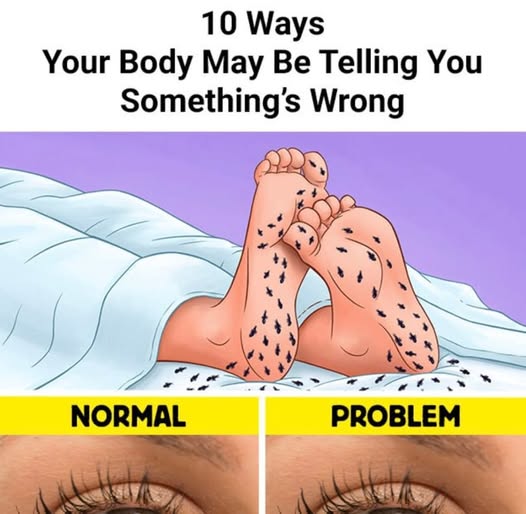Pay Attention to Subtle Signals from Your Body
Your body is constantly communicating with you. If you listen carefully, it can reveal when something isn’t quite right. While some signals are obvious—like a fever indicating an infection—others are more subtle and can go unnoticed. These subtle signs may indicate chronic health issues that, if ignored, could escalate into serious problems.
Here are ten subtle signs of poor health and what you can do about them:
1. Restless Leg Syndrome (RLS)
A crawling or tingling sensation in your legs, accompanied by an uncontrollable urge to move, could indicate Restless Leg Syndrome (RLS). This condition often occurs during the evening or nighttime and can disrupt sleep, affecting overall quality of life.
Symptoms include:
- Crawling or creeping sensations
- Pulling, throbbing, or aching feelings
- Itching or electric-like sensations
What to do:
- Consult your doctor for medications, such as dopamine-enhancing drugs or muscle relaxants.
- Try home remedies like warm baths, massages, or hot and cold packs.
- Establish a healthy sleep routine and engage in moderate, regular exercise.
- Reduce caffeine intake and discuss special aids like foot wraps with your doctor.
2. Thickening Skin

Thick, itchy skin may signal underlying health issues, including:
- Pityriasis Rubra Pilaris (PRP): A chronic inflammatory skin condition.
- Psoriasis: Rapid skin cell production leading to red, scaly patches.
- Hypothyroidism: A condition where the thyroid gland produces insufficient hormones.
What to do:
- Consult a doctor for blood tests and accurate diagnosis.
- Follow a treatment plan tailored to the underlying condition.
3. Changes in Handwriting, Smell, or Dreams
Subtle changes in handwriting, a diminished sense of smell, or altered dream patterns could be early signs of Parkinson’s disease. Symptoms often progress gradually and may include tremors, stiffness, and impaired coordination.
What to do:
- Consult your doctor for a thorough evaluation.
- Early diagnosis can help in managing symptoms more effectively.
4. Excessive Anger or Aggression
Read more on next page
ADVERTISEMENT
ADVERTISEMENT



